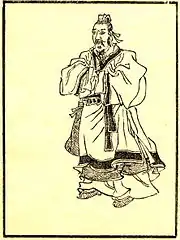 | |||||||||
| Nazwisko chińskie | |||||||||
|---|---|---|---|---|---|---|---|---|---|
| |||||||||
Guo Pu (ur. 276, zm. 324[1]) – chiński pisarz i poeta z czasów dynastii Jin.
Pochodził z niskiej rodziny urzędniczej mieszkającej w Wenxi w prowincji Shanxi[2]. Zajmował się pisaniem komentarzy do starożytnych tekstów takich jak Erya[3] i Shanhaijing[4]. Napisał także traktat Zangshu (葬書), poświęcony wyborowi miejsca pochówku zmarłych, który jest jednym z najważniejszych podręczników feng shui[5]. Po śmierci stał się bohaterem licznych legend, opisujących go jako wróżbitę i magika[6].
Przypisy
- ↑ Benjamin Penny: Religion and Biography in China and Tibet. Richmond, Surrey: Curzon Press, 2002, s. 41. ISBN 0-7007-1177-5.
- ↑ Kang-i Sun Chang, Stephen Owen: The Cambridge History of Chinese Literature. T. 1. Cambridge: Cambridge University Press, 2010, s. 204. ISBN 978-0-521-11667-0.
- ↑ Hans Stumpfeldt: Han-Zeit. Wiesbaden: Otto Harrassowitz Verlag, 2006, s. 301. ISBN 3-447-05445-4.
- ↑ John Lagerwey, Marc Kalinowski: Early Chinese religion. T. 1. Leiden: Brill, 2009, s. 405. ISBN 978-90-04-17208-1.
- ↑ Eva Wong: Opowieści o taoistycznych nieśmiertelnych. Poznań: Zysk i S-ka, 2003, s. 159. ISBN 83-7298-422-0.
- ↑ Dominik Declercq: Writing Against the State: Political Rhetorics in Third and Fourth Century China. Leiden: Brill, 1998, s. 249. ISBN 90-04-10376-7.
This article is issued from Wikipedia. The text is licensed under Creative Commons - Attribution - Sharealike. Additional terms may apply for the media files.